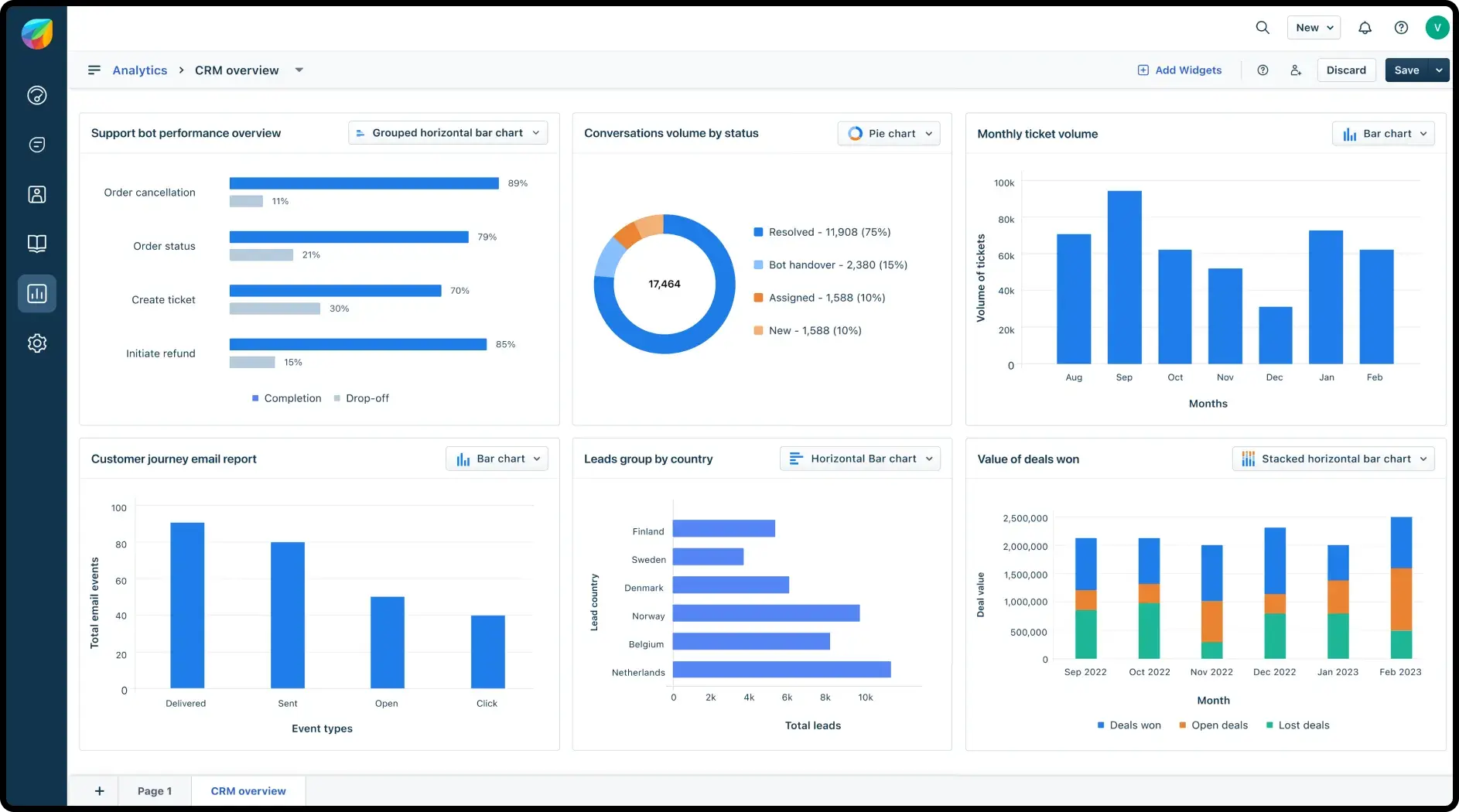“By far the most efficient approach to deal with your leads is always to use a process that automatically brands you, supplies worth to your prospects, follows up with them, and sorts out the uninterested people.”
– MLM Lead Generation
Lead management can feel like finding your way through a maze where every right decision moves you closer to or further away from success.
To succeed, you need to skillfully handle potential customers from their first point of contact to the final sale.
Lead Management CRM is at the center of this crucial process. It’s a powerful tool designed to make the sales journey smooth and ensure no opportunity slips away.
In this guide, I’ll walk you through what CRM lead management is, its process, why it’s important, and how implementing it can significantly impact your sales.
Let’s get started!
What Is a Lead Management CRM?
Lead Management CRM is a comprehensive tool designed to improve how businesses interact with potential customers.
It’s about tracking, managing, and nurturing leads from the moment they show interest in a product or service all the way through to the final sale.
This system leverages technology to score, categorize, and prioritize leads, ensuring that sales teams can focus their efforts on the prospects most likely to convert.
By meticulously organizing lead information, Lead Management CRM enables sales strategies to be tailored to each prospect’s unique needs and position in the buying journey. This makes the sales process not only more efficient but also highly personalized.
The capabilities of Lead Management CRM extend beyond mere organization. They include automated follow-ups, targeted marketing campaigns, and deep analytics on lead behavior, collectively saving time and enabling a more strategic approach to converting leads.
How Does a CRM Help in Lead Management?
A CRM streamlines lead management, taking you from initial inquiry to closed deal with both efficiency and a personalized touch. Here’s how:
1. Centralized Lead Information
A CRM system consolidates all lead-related data—contact details, interaction logs, preferences, and notes—into a single, unified database. This centralization ensures that sales teams have immediate, comprehensive access to each lead’s information, enabling more informed and personalized interactions.
With a CRM for lead managers, there’s no need to toggle between different systems or databases, significantly reducing the time spent searching for information and minimizing the risk of overlooking critical lead data.
2. Automated Lead Capture
This feature eliminates the manual labor involved in entering new leads into the system. Automatically capturing leads from various sources such as webforms, emails, and social media platforms and integrating them directly into the CRM ensures a timely and accurate recording of potential customers.
3. Contact Synchronization
Keeping contact details consistent across all platforms and touchpoints is vital for maintaining effective communication. Contact synchronization updates lead information in real-time, ensuring that changes are immediately reflected across the system.
This feature supports the accuracy of outreach efforts, ensuring that communications are always directed to the right channels and based on the latest lead data.
4. Task Automation and Reminders
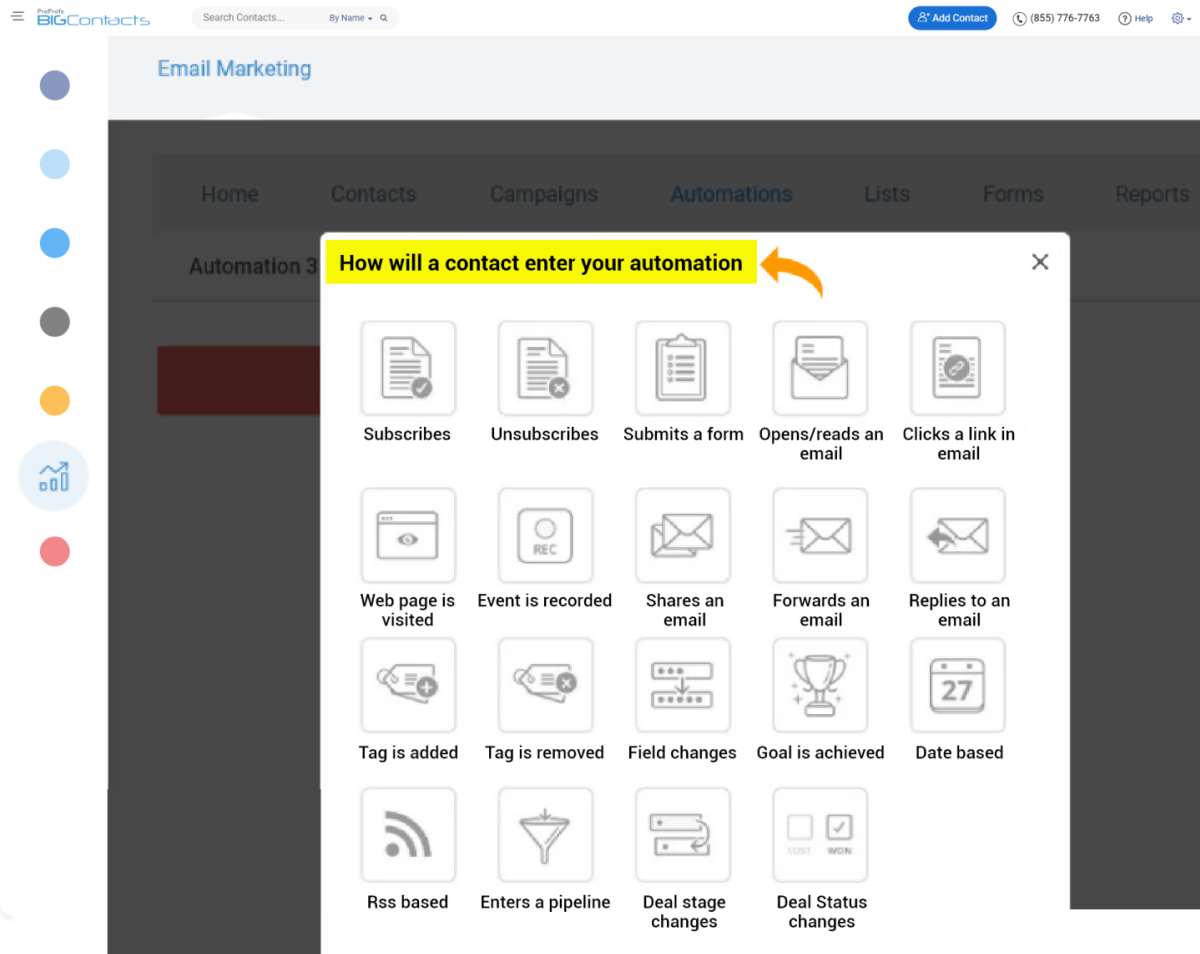
Automating repetitive tasks such as follow-up emails and setting reminders for crucial touchpoints with leads ensures consistent engagement without manual oversight. It helps maintain a regular contact schedule, ensuring that leads are nurtured appropriately and efficiently, thereby increasing the likelihood of conversion./
5. Sales Pipeline Visualization
Visual representation of the sales pipeline within the CRM provides clear, actionable insights into the status of various leads and opportunities. This visualization allows sales teams to quickly identify which leads need attention, understand where bottlenecks in the sales process might be occurring, and strategically plan their next steps.
6. Detailed Interaction Tracking
Every interaction with a lead is tracked and recorded, creating a comprehensive history of engagements. It helps tailor future communications and understand the lead’s journey and needs. Sales teams can pick up exactly where the last interaction left off, ensuring a seamless and contextually relevant dialogue with each lead.
7. Lead Qualification Tools
Prioritizing leads based on their potential to convert is streamlined with lead qualification tools. By scoring leads against predefined criteria such as engagement level, fit with the product/service, and purchase readiness, sales teams can focus on nurturing those with the highest likelihood of conversion and optimizing resource allocation.
8. Advanced Segmentation
Segmentation tools allow leads to be categorized into specific groups based on characteristics such as demographics, behavior, or source. This enables highly targeted marketing and sales campaigns, ensuring that messages are crafted to address different segments’ distinct needs and interests, thereby increasing engagement.
9. Email Marketing Automation
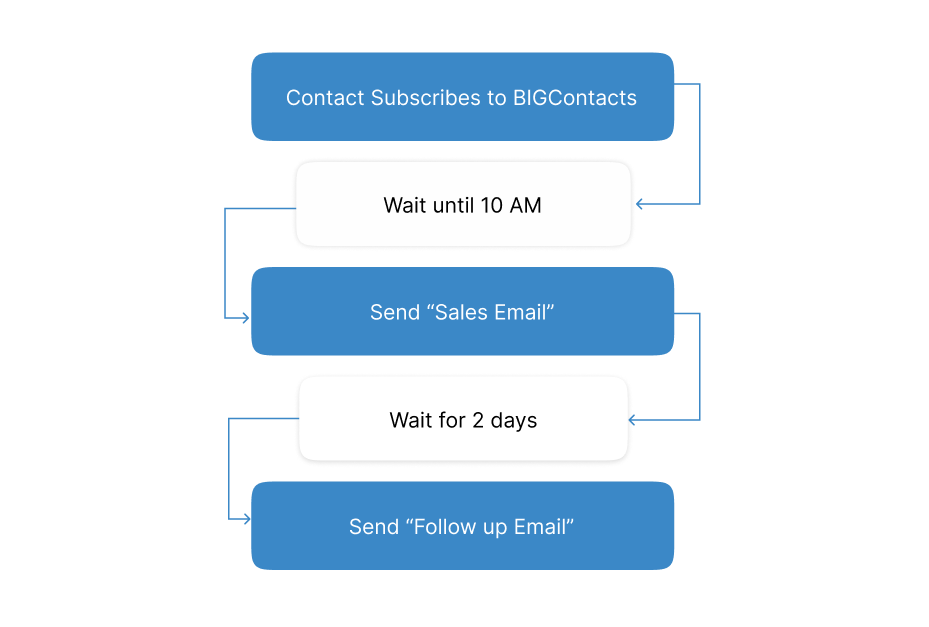
Email Marketing automation in a CRM system tailors interactions with leads through automated, personalized communication. It efficiently schedules emails, social posts, and targeted ads based on each lead’s interests and behaviors.
This automation nurtures leads with the right content at the right time, significantly enhancing the potential for conversion.
10. Integration Capabilities
The ability to integrate with other business tools and platforms ensures a seamless workflow and a cohesive lead management strategy. This connectivity allows for the automatic exchange of data between systems, reducing manual data entry and ensuring that lead information is always current and comprehensive.
You can also integrate your CRM with a help desk system to enhance customer support experiences, directly influencing customer satisfaction and opening new avenues for sales.
Watch: How CRM With Helpdesk Helps in Generating More Sales Opportunities
11. Performance Analytics and Reporting
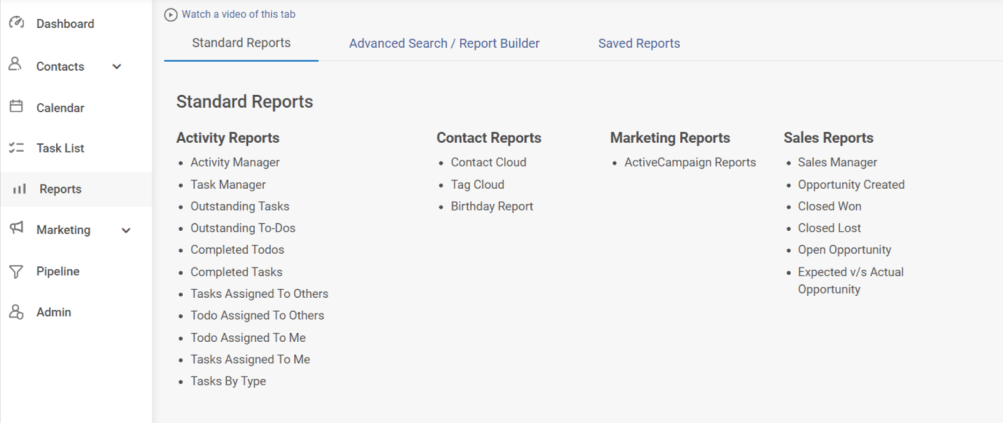
Comprehensive analytics and customizable reports generated by the CRM provide deep insights into the effectiveness of lead management activities. These insights enable continuous refinement of strategies, helping identify successful tactics and areas needing improvement and ensuring data-driven decisions that enhance lead conversion rates.
12. Mobile Access
The ability to access and manage lead information on the go is critical in today’s fast-paced sales environments. A mobile CRM ensures sales professionals can update lead statuses, schedule follow-ups, and access crucial information from anywhere, enabling timely and flexible responses to lead activities.
By streamlining lead management, a CRM significantly enhances the efficiency of the sales process, directly contributing to increased sales outcomes. This demonstrates the CRM’s critical role as a tool that not only simplifies operations but also drives tangible business growth.
Watch: How CRM Software Helps in Improving Sales
What Is the Process of Lead Management
Lead management is all about handling potential customers (leads) efficiently, from the moment they show interest to the point where they’re ready to buy. Think of it as a step-by-step process to nurture relationships and guide leads toward making a decision.
Here’s how it typically works:
- Capturing Leads – This is the first step. Leads can come from anywhere—your website, social media, or even in-person events. The goal is to grab their information, like an email or phone number.
- Organizing Leads – Once captured, you need to sort and organize them. This is where tools like CRM (Customer Relationship Management systems) come in handy, keeping all your leads in one place.
- Qualifying Leads – Not every lead is ready to buy, so this step helps figure out who’s genuinely interested. You can use criteria like budget, need, and timing to prioritize.
- Nurturing Leads – Here’s where you build relationships. Sending helpful emails, sharing product info, or answering questions helps keep the lead engaged and informed.
- Converting Leads – The final step is turning those leads into customers by closing the deal—whether through a demo, a special offer, or simply the right follow-up.
Lead management isn’t just about keeping track of leads; it’s about creating a smooth and meaningful journey for them. With a good system in place, it’s easier to build trust and grow your business.
How to Implement CRM to Manage Leads Better
Implementing a customer relationship management (CRM) system for effective lead management is a strategic move that can significantly enhance your business’s approach to handling potential customers.
Here’s the CRM lead management process.
Step 1: Evaluate & Select the Right CRM
Assessment: Begin by thoroughly assessing your business’s specific needs, considering the size of your sales team, expected growth, and the complexities of your sales process. Identify key challenges in your current process for managing leads in CRM.
Selection Criteria: Choose a CRM based on critical functionalities like scalability, user-friendliness, integration capabilities, and mobile access. Ensuring the CRM can be accessed on mobile devices is crucial for sales teams to stay connected and responsive, regardless of their location.
If you’re a small or medium-sized business, here’s a video tutorial to help you make the right pick:
Step 2: Configure Your CRM to Match Your Sales Process
Customization: Tailor the CRM to accurately mirror your sales pipeline, including custom fields for detailed lead information and stages from lead capture to conversion. This ensures a seamless fit with your existing sales and marketing workflows.
Contact Management: Implement the CRM’s contact management features to organize lead data systematically. Effective categorization facilitates focused and strategic follow-up efforts.
Step 3: Set up Lead Capture, Distribution & Scoring
- Lead Capture Automation: Configure the CRM to automatically pull leads from various channels, like websites and social media, directly into your sales pipeline, eliminating manual data entry.
- Lead Distribution: Use CRM functionalities to auto-assign leads to the appropriate sales rep based on predefined criteria, ensuring leads are quickly and efficiently followed up on.
- Lead Scoring: Set up a lead scoring system within the CRM that assigns values to leads based on their engagement, behavior, and other pertinent criteria. This helps prioritize leads and allocate resources more effectively.
Step 4: Nurture Leads with Precision
- Marketing Automation: Utilize the CRM’s marketing automation tools to craft personalized email campaigns and content strategies tailored to different stages in the lead’s journey, enhancing engagement and moving leads closer to conversion.
- Nurturing Workflows: Create customized workflows that trigger specific actions (e.g., sending targeted emails or alerts to sales reps) based on lead activities, ensuring a consistent and personalized nurturing process.
Step 5: Enhance Collaboration Across Teams
Leverage the CRM to enable team members to share lead insights, notes, and tasks. This fosters a collaborative environment, ensuring all team members are aligned and informed.
Step 6: Leverage Analytics for Informed Decision Making
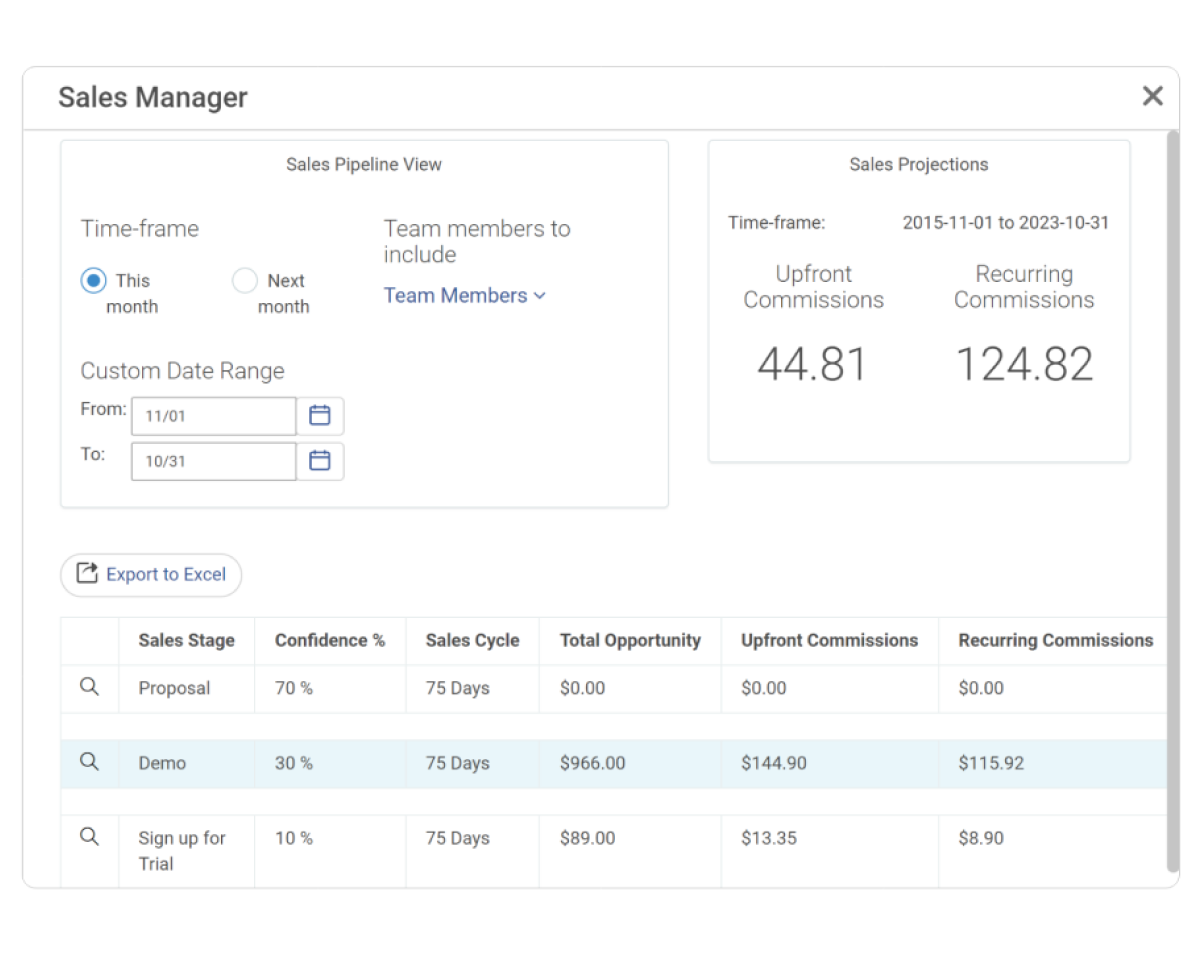
- Performance Monitoring: Use the CRM’s analytics and reporting capabilities to track vital metrics like conversion rates, effectiveness of lead sources, and length of sales cycles. This data is crucial for identifying improvement areas and optimizing strategies.
- Continuous Improvement: Regularly review analytics to refine your lead management approach. Adjust your strategies based on data-driven insights to improve lead conversion rates and overall sales performance.
Step 7: Prioritize Ongoing Training and Feedback
Ensure your team is well-trained in CRM functionalities, as continuous education helps maximize the utilization of the CRM’s features. Also, establish a system for collecting feedback from your team regarding the CRM’s usability and the lead management process. This feedback is invaluable for making ongoing improvements to your CRM lead manager setup.
By meticulously selecting a CRM that aligns with your operational needs and following these steps for implementation and optimization, you set the foundation for a robust lead management system.
This system streamlines your lead management efforts, supports dynamic sales growth, and strengthens customer relationships.
Why Is Lead Management Important?
Lead management is a pillar in the architecture of sales strategy, ensuring that the effort invested in generating leads translates into tangible results. This system maintains an organized database of potential customers and ensures that each lead is actively guided through the sales funnel.
Here’s why prioritizing lead management is essential for any business aiming for growth and profitability:
1. Prevents Lost Opportunities
The journey from lead generation to conversion is filled with potential pitfalls where valuable leads can be lost due to neglect or inefficient handling. An effective CRM lead management process acts as a safety net, ensuring no opportunity for engagement or sales slip through unnoticed.
By providing a clear overview of all leads and their status, sales teams can quickly identify and act on hot prospects, significantly reducing the chance of missed opportunities.
2. Enhances Conversion Rates
At the heart of lead management is the capability to deliver personalized interactions based on each prospect’s specific needs and behaviors. This tailored approach enriches the customer experience and significantly boosts the likelihood of converting leads into customers.
By systematically managing leads, you can fine-tune your sales pitch to meet the unique preferences of their audience, improving overall conversion rates.
3. Boosts Team Productivity
Lead management tools, especially those equipped with automation features, streamline various aspects of the sales process, from initial contact to follow-ups. By automating routine tasks, sales representatives are freed to focus on more critical, revenue-generating activities.
Moreover, having access to organized lead information and clear insights into each lead’s position in the sales cycle empowers reps to act more effectively and efficiently.
4. Identifies High-Value Leads
Not all leads are created equal. Some have a higher potential for conversion than others. Lead management systems help distinguish high- and low-quality leads through scoring mechanisms.
This prioritization ensures that sales efforts are concentrated on leads that are most likely to result in successful conversions, optimizing the allocation of resources and maximizing return on investment.
5. Tracks Lead Origins
Understanding where your leads are coming from is crucial for optimizing marketing strategies and resource allocation. Lead management provides valuable insights into the most effective channels for lead generation, whether it be social media, email marketing, or direct inquiries.
By analyzing lead sources, businesses can refine their marketing efforts to focus more on high-performing channels, ensuring a better yield of quality leads.
6. Facilitates Better Forecasting and Strategy Planning
With comprehensive data on lead behavior, preferences, and engagement, businesses can make more informed decisions about future sales strategies and marketing campaigns.
This predictive insight helps forecast sales trends, plan inventory, and set realistic sales targets, making lead management an invaluable tool for strategic planning.
By integrating effective lead management practices, including managing leads in a CRM, businesses can significantly enhance their sales funnel’s efficiency, ensuring that every lead receives the attention it deserves and driving more conversions.
Stages of Lead Management
Lead management isn’t just a random process; it’s a structured journey that helps you guide potential customers effectively. Let’s break it down step by step:
Stage 1: Lead Generation
This is the very first step where you attract leads. It’s all about creating awareness and capturing interest. Whether it’s through your website, social media, paid ads, or events, your goal is to draw people in and collect basic information like their name and email. Without lead generation, you wouldn’t have anyone to manage in the first place!
Stage 2: Lead Capturing
Once you’ve generated interest, it’s time to capture leads and store their information properly. You’ll want to use tools like CRMs to keep everything organized. This stage ensures no lead gets lost or forgotten. By having a central place for all your lead data, you’re setting yourself up for smoother communication and follow-ups down the line.
Stage 3: Lead Qualification
At this stage, you’re separating the serious leads from the casual browsers. You’ll assess their interest level based on criteria like their actions (e.g., signing up for a webinar) or their needs. Qualified leads are those who are more likely to convert. This step helps you focus your efforts on the people who are truly interested and ready to move forward.
Stage 4: Lead Nurturing
Here’s where the relationship-building happens. In this stage, you engage your leads by sending them helpful resources, personalized emails, or even a friendly follow-up call. The idea is to keep them interested and show them how your product or service solves their problems. Lead nurturing builds trust and keeps you on their radar until they’re ready to make a decision.
Stage 5: Lead Conversion
This is the stage where all your hard work pays off. You turn those nurtured and qualified leads into customers by closing the deal. It could be through a demo, a customized offer, or a final conversation that addresses any last-minute concerns. At this point, it’s all about sealing the deal and welcoming them as a happy customer.
By following these stages, you create a seamless and effective process for turning potential leads into loyal clients!
Top 9 Best Practices for Lead Management
Here are the top 9 best practices for effective lead management to help you maximize conversions and build stronger customer relationships:
1. Define Your Ideal Customer Profile
Knowing who you’re targeting is the first step to effective lead management. Take time to create a detailed profile of your ideal customer based on demographics, industry, challenges, and buying behavior. This profile helps you and your team focus on leads that are most likely to convert, saving time and improving overall efficiency.
2. Implement Lead Scoring
Lead scoring allows you to rank leads based on their likelihood to convert. By assigning points to each lead according to factors like engagement, behavior, or job role, you can prioritize high-quality leads. This helps your team focus on those with the highest potential, speeding up the sales process and making interactions more impactful.
3. Capture Leads Across Multiple Channels
Diversifying lead sources can greatly expand your reach. Use web forms, social media, email campaigns, and even offline events to gather new leads. Make sure each channel is optimized to collect relevant information, making it easier to follow up and personalize your outreach based on where the lead originated.
4. Use a CRM for Lead Management
A CRM system is essential for organizing and tracking leads effectively. It consolidates all lead data in one place, allowing your team to view interactions, status updates, and more. With automated follow-ups and reminders, a CRM helps ensure no lead falls through the cracks and keeps your lead management process seamless.
5. Nurture Leads With Targeted Content
Not every lead is ready to buy immediately. Use targeted content, like newsletters, blogs, and case studies, to engage leads based on their stage in the buying journey. Lead nurturing keeps your brand top of mind and helps leads move further down the sales funnel naturally.
6. Align Sales and Marketing Teams
Your sales and marketing teams need to work closely to understand lead needs and messaging. Aligning these teams ensures that leads are not only captured effectively but also handed over seamlessly from marketing to sales. Regular meetings and shared goals keep both teams focused on lead conversion.
7. Track and Analyze Lead Behavior
Understanding lead behavior, like pages visited or emails opened, gives insight into their interests. By analyzing this data, you can tailor your approach to better match each lead’s needs and readiness to buy. This targeted approach boosts your chances of successful conversions and deeper relationships.
![]()
8. Set Clear Follow-Up Schedules
Consistency is key in lead management. Set a follow-up schedule based on lead interest and behavior to avoid overwhelming or neglecting leads. A regular follow-up plan keeps leads engaged, reinforces your brand, and ensures your team is always in sync with where each lead is in the buying process.
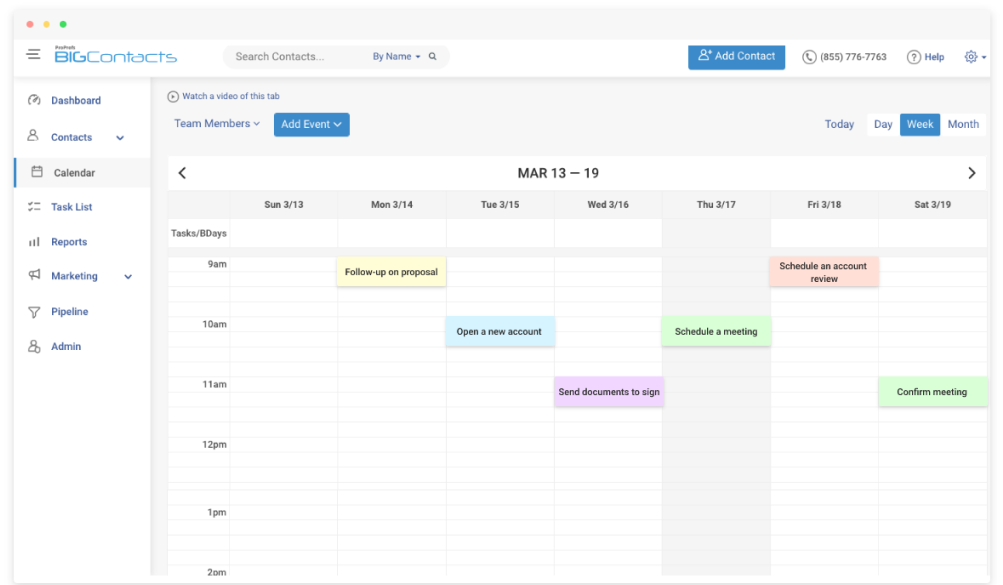
9. Continuously Review and Improve Your Process
The lead management process should evolve with your business. Regularly reviewing your strategies helps you see what’s working and where there’s room for improvement. By following a comprehensive lead management guide, you can gather valuable feedback from your sales team and analyze conversion rates to refine your approach and stay competitive.
Top 6 Lead Management Tools and Technologies
To compile this list, I have assessed each tool’s ease of use and scalability, ensuring they meet the diverse needs of consultants. My evaluation includes my personal experiences, insights from reputable reviews, and feedback from industry peers.
| CRM | Best For | Pricing |
|---|---|---|
| BIGContacts | Contact Management & Email Marketing | Forever free for small teams. Paid plan starts at $9.99/month |
| Freshworks | Deal Management | Starts at $10.6/user/month |
| Pipedrive | Sales-Focused Teams | Starts at $14/user/month |
| Salesforce | Large and Complex Sales Organizations | Custom pricing |
| Zoho CRM | Omnichannel Engagement | Starts at $15.3/user/month. |
| HubSpot | Centralizing Sales, Marketing, & Support Operations | Starts at $15/user/month. |
1. BIGContacts – Best for Contact Management & Email Marketing for Startups & Small & Medium Businesses
When I used BIGContacts, I found it to be a simple yet powerful tool for managing contacts and running email marketing campaigns. It had everything I needed to organize leads, track conversations, and stay on top of follow-ups.
The lead management features were a standout—it automatically captured leads from web forms and tracked their interactions so I didn’t miss any opportunities. The email marketing side was equally impressive. I could create and schedule campaigns easily, segment my audience, and even track open and click-through rates.
The automation capabilities saved me a ton of time, like sending personalized follow-ups based on predefined triggers. For lead management specifically, features like activity tracking, deal stages, and email integrations really helped streamline the entire process.
What You’ll Like:
- Easy lead tracking with web forms and activity logs to ensure no potential opportunities are missed
- Customizable dashboards for tracking deals and pipelines, helping you visualize progress and stay organized
- Task management for automating repetitive actions like data entry, meeting reminders, and recurring events
- Custom fields to tailor appointment details to your business needs, ensuring all relevant information is easily tracked and accessible
- Awesome human support 24/7 via phone, chat, and knowledge base
- The interface is user-friendly and helps in navigating easily
What You May Not Like:
- No downloadable or on-premise version
- No dedicated account manager for the free plan, unlike the paid
Pricing:
- Forever free for small teams. Paid starts at $9.99/month.
2. Freshworks – Best for Deal Management
Image Source: Freshworks
When I used Freshworks CRM, managing deals became easier for me. Its deal management tools let me track every stage of my pipeline effortlessly, from initial outreach to closing. I especially liked the visual sales pipeline. Adding, moving, or updating deals was simple, and automated reminders ensured I stayed on top of follow-ups.
Its lead scoring helped me prioritize prospects effectively, while automated lead assignment saved hours of manual work. The integration with email helped me to track conversations and respond directly from the platform.
What I appreciated most was the smart insights feature—it gave me data-backed suggestions for closing deals faster. Freshworks CRM made it easy to focus on what mattered: building relationships and closing deals.
What You’ll Like:
- AI-powered insights to help prioritize and close deals efficiently
- Role-based user permissions to ensure secure access and better control over sensitive data
- Ticket routing to manage support by automatically assigning queries to the right team members
- Workflow automations to reduce manual tasks, saving time and improving overall productivity
What You May Not Like:
- Customer support response times could be faster, which might delay resolving urgent issues
- Advanced customization options are limited, which may restrict tailoring the tool to specific needs
Pricing:
- Starts at $10.6/user/month
3. Pipedrive – Best for Sales-Focused Teams
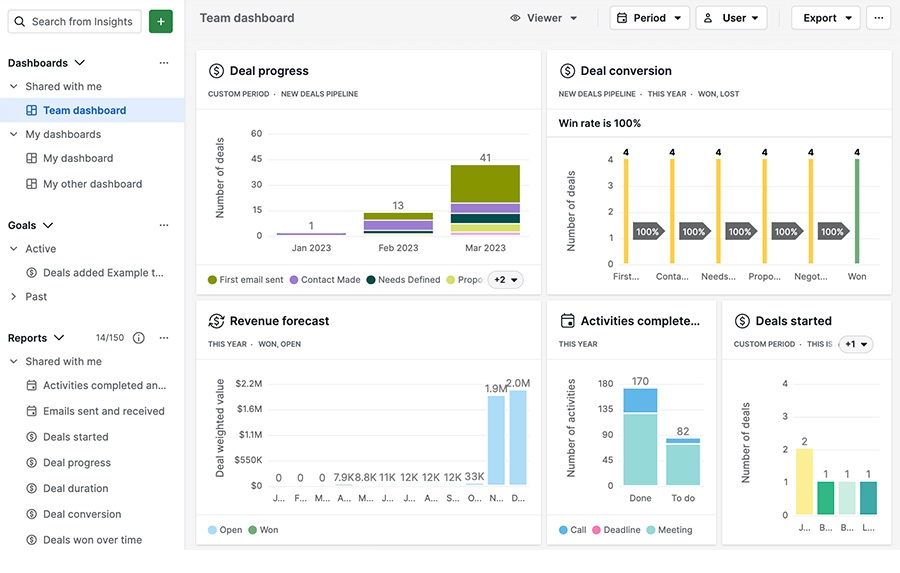
Image Source: Pipedrive
When I used Pipedrive, it felt like having a personal assistant for sales. Its pipeline management was incredibly intuitive—I could drag and drop deals, add notes, and set follow-up reminders in seconds. The customizable pipelines made it easy to tailor the process to my team’s workflow.
What really stood out for me was its lead management capabilities. The tool automatically captured leads from web forms and emails, saving me from manual entry. Plus, the lead scoring feature helped prioritize the hottest prospects, ensuring I focused on the right opportunities.
Pipedrive also offered smart automation tools to eliminate repetitive tasks, like sending follow-ups or updating deal stages. And with detailed sales reports, I got a clear picture of my team’s performance and where we could improve.
What You’ll Like:
- User-friendly drag-and-drop interface to organize tasks and manage workflows effortlessly
- Automated follow-up reminders to ensure you stay on top of deals, helping prevent missed opportunities
- Built-in sales forecasting to plan and strategize effectively
- Detailed activity logging to capture every interaction, ensuring that all communications are well-documented
What You May Not Like:
- Basic features are missing from lower-tier plans
- Some users find the reporting features less comprehensive than other CRMs
Pricing:
- Starts at $14/user/month.
4. Salesforce – Best for Large and Complex Sales Organizations
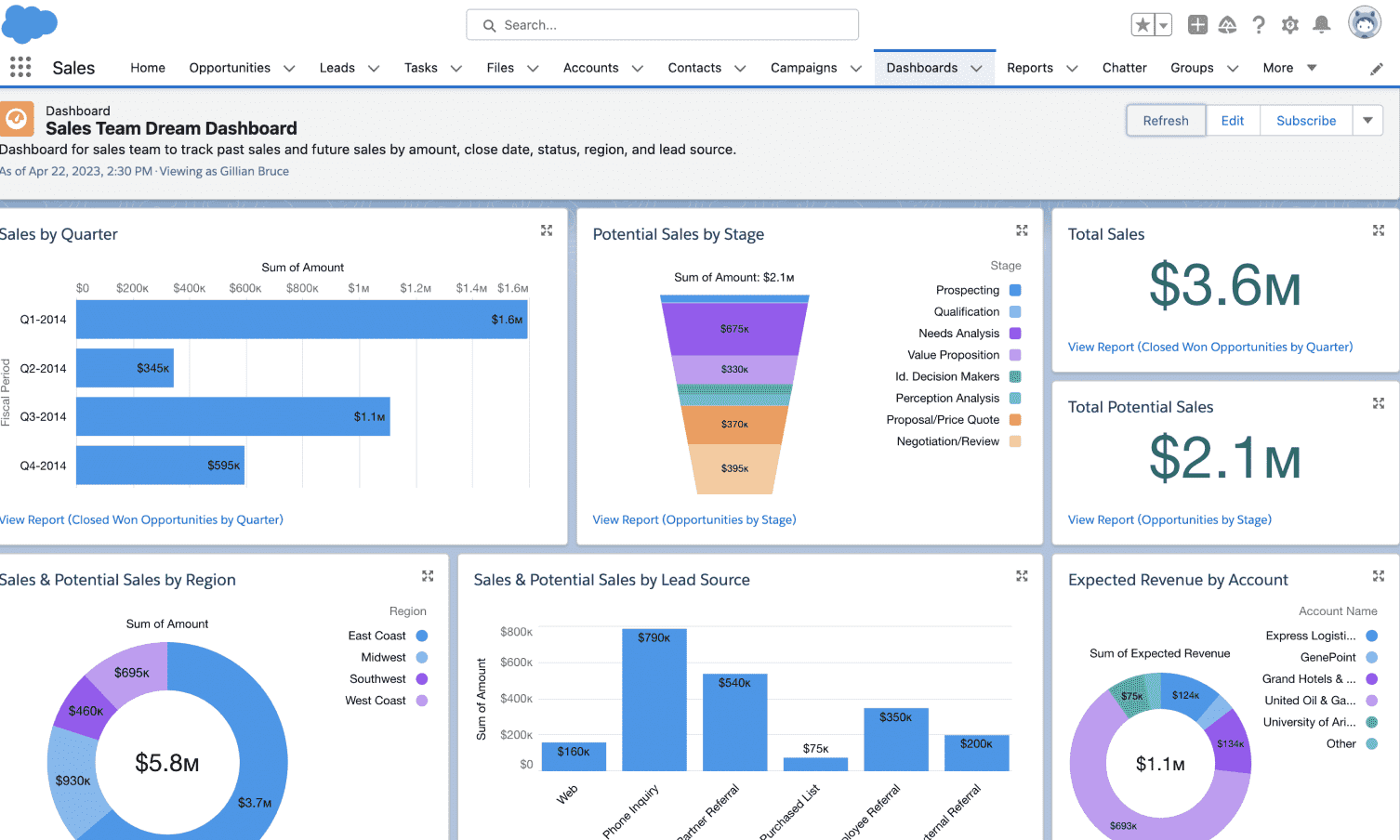
Image Source: Salesforce Admins
When I used Salesforce CRM, it was clear that it’s built for handling large-scale sales operations. Its customization options were a standout—I could tailor almost every aspect to fit specific business needs, from custom dashboards to detailed reporting.
The tool kept my sales pipeline organized, and automating tasks like follow-ups and reminders helped me stay on top of my workload. Its lead scoring system helped me identify high-priority prospects, while automated lead assignment ensured smooth handovers between teams.
I particularly liked how it integrated with various data sources, giving me a 360-degree view of each lead. The ability to track interactions across email, phone, and meetings made it easy to nurture relationships and close deals faster.
What You’ll Like:
- Comprehensive lead tracking with real-time updates for better pipeline visibility
- Workflow automation for streamlining repetitive tasks and improving efficiency
- Detailed contact management with interaction history for building stronger relationships
- Built-in collaboration tools to align sales and marketing teams effectively
What You May Not Like:
- Some users reported occasional performance lags with large datasets.
- Frequent updates sometimes disrupt workflows or require reconfiguration
Pricing:
- Custom pricing
5. Zoho CRM – Best for Omnichannel Engagement
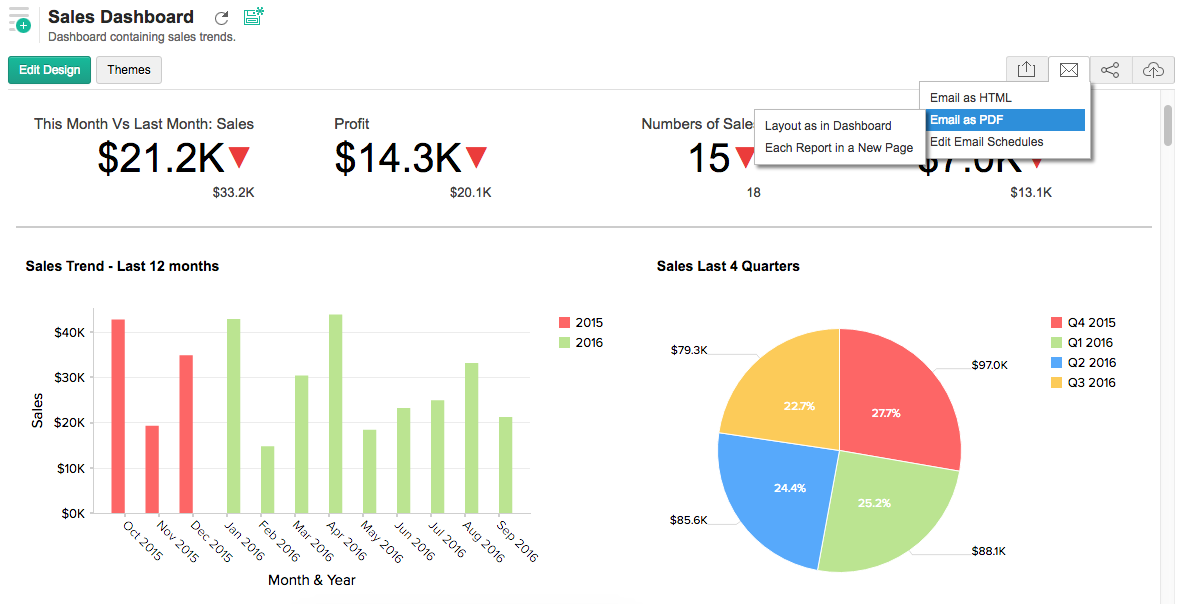
Image Source: Zoho CRM
When I used Zoho CRM, I felt like I had a complete view of my customers across every channel. Whether it was email, social media, or phone calls, everything was connected, and I could seamlessly engage with leads and customers in one place.
The multichannel communication features were also helpful for keeping track of interactions without switching between tools. Its AI-powered lead scoring helped me focus on high-quality leads, while automated workflows took care of repetitive tasks like assigning leads to the right team members.
I also loved the ability to set up custom fields and workflows, which made it easy to tailor the platform to my specific needs. Real-time notifications about lead activity kept me one step ahead, ensuring I never missed a follow-up opportunity.
What You’ll Like:
- Multichannel communication tools for seamless customer engagement, ensuring all interactions are centralized and easily managed
- AI-powered Zia assistant for lead scoring and forecasting, helping prioritize leads and predict sales outcomes accurately
- Sales pipeline tracking with customizable stages for better deal management
- Sales pipeline tracking with customizable stages for better deal management
What You May Not Like:
- Complex setup process, especially for advanced customizations
- Customer support is sometimes slow to resolve issues
Pricing:
- Starts at $15.3/user/month.
6. HubSpot – Best for Centralizing Sales, Marketing, & Support Operations

Image Source: Hubspot
When I used HubSpot CRM, I quickly realized how well it streamlined sales, marketing, and support operations into one cohesive system. The platform made it easy to manage my sales pipeline while simultaneously running email campaigns and tracking customer interactions.
What stood out was the seamless integration between teams—I could hand off leads from marketing to sales without missing a beat. HubSpot excelled at lead management. Its contact tracking feature gave me a complete history of every interaction, and the lead scoring system helped me focus on high-priority prospects.
I also loved how automation handled routine tasks like follow-ups and email scheduling, freeing me up to focus on nurturing relationships. Customizable dashboards and real-time analytics kept me informed about my team’s performance, making it easier to adjust strategies when needed.
What You’ll Like:
- Visual workflow builder to automate repetitive marketing tasks, such as lead nurturing email sequences, internal notifications, and data updates
- Lead capture tools like customizable forms, pop-up CTAs to landing pages, and live chat to attract and capture leads
- Social media management to schedule and publish content across multiple social media platforms directly from HubSpot
- Sales pipeline management to track deals and opportunities from initial contact to close and leverage AI-powered insights to prioritize sales activities and improve win rates
What You May Not Like:
- While HubSpot provides a variety of templates for emails, landing pages, etc., the extent of customization might be restrictive
- Exporting or migrating your data can be complex and time-consuming
Pricing:
- Starts at $15/user/month.
Manage Leads Effectively for Better Sales Outcomes
CRM lead management plays a major role in driving your sales success. To make the most of this process, invest in a scalable, functional CRM to manage leads efficiently.
When selecting a CRM tool, start by carefully assessing your needs, growth goals, market trends, and customer profiles. Look for options offering free trials for hands-on experience, and involve your sales team to confirm the tool meets your requirements.
A reliable CRM for lead management, like BIGContacts, allows you to seamlessly track every lead. It also has a forever-free plan. It enables you to qualify leads, boost engagement, and drive buying decisions through personalized interactions—ultimately maximizing your sales results and business outcomes.
FAQ
What is lead management?
Lead management is the process of tracking and nurturing potential customers, guiding them through your sales funnel from initial interest to final purchase. With CRM leads management, you can organize lead data, prioritize prospects, and personalize interactions, ensuring no opportunity is missed and making it easier to turn leads into loyal customers.
What is the best way to manage leads?
The best way to manage leads is by using an organized CRM lead management process. Start by capturing and scoring leads to prioritize those most likely to convert. Use CRM tools to centralize lead information, automate follow-ups, and track progress. This streamlines your efforts, helps personalize interactions, and ultimately improves your conversion rate.
What is the future scope of CRM lead management?
The future of CRM lead management looks promising, with advanced tools and AI-driven insights reshaping how businesses handle leads. As technology evolves, you’ll find that a CRM lead manager can automate more tasks, personalize customer interactions, and provide deeper analytics, making it easier to convert leads and boost customer loyalty.
Which is the best CRM for Lead Management?
The best CRM for lead management depends on your specific business needs, but an easy-to-use, scalable option like BIGContacts is a strong choice. It simplifies tracking, qualifying, and engaging leads, helping you focus on conversions. Plus, its customization and automation features make lead management more effective and time-saving for your sales team.
How do you choose the best lead management CRM?
To choose the best lead management CRM, start by identifying your business needs and goals. Look for features like lead scoring, tracking, and automation that fit your sales process. Free trials can help you test functionality, and involving your sales team ensures it meets their needs. A reliable CRM keeps lead management smooth and effective.
For more, watch:
FREE. All Features. FOREVER!
Try our Forever FREE account with all premium features!


